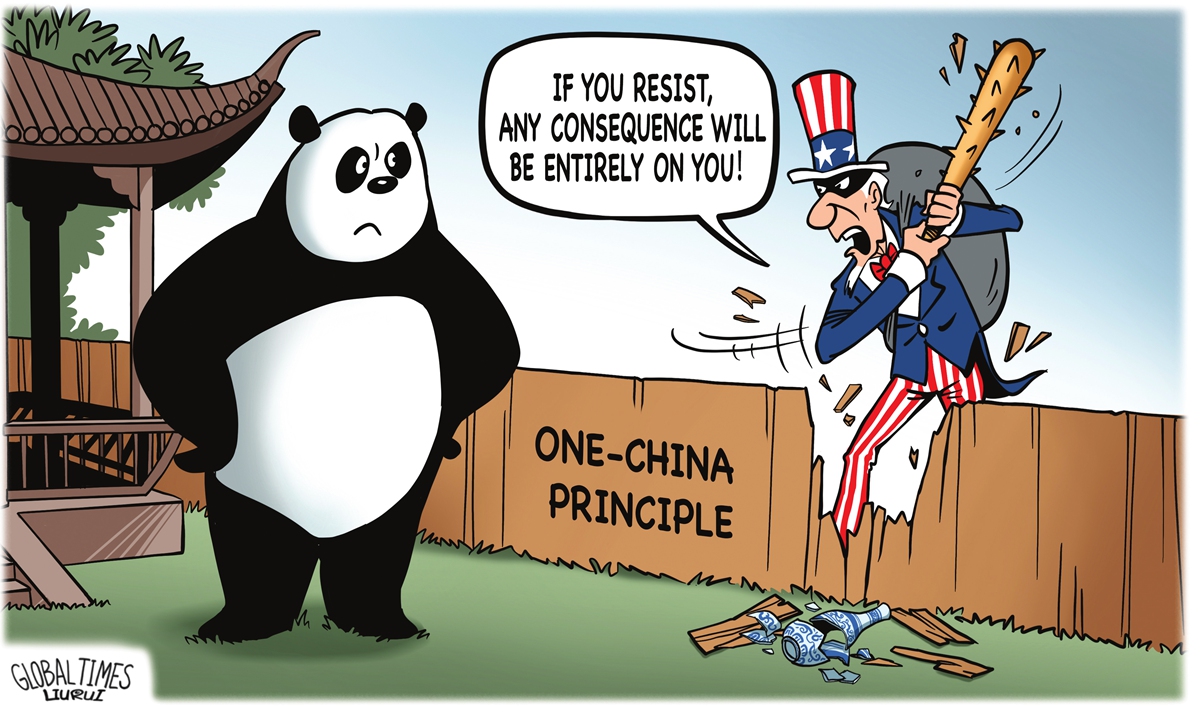
China, US Illustration: Liu Rui/GT
Recently, the US has shown more characteristics of conflict and confrontation in its policies toward China. Yet it defends its ill-intentioned behavior in the name of its self-defined "international rules." US foreign policy is beset with a chronic disease - its words are not consistent with its deeds. That disease is now becoming increasingly overt and harmful.
First, the US has lost credibility on the Taiwan question, the most consequential and sensitive core issue in China-US relations. The Joe Biden administration's stance - that the US' one-China policy has not changed - has been damaged by the specific moves by Washington, including raising the level of "official" ties with the island of Taiwan. The US side is well aware that one China is the general consensus of the international community today, and it is one of the important pillars recognized by the vast majority of countries to maintain regional and even global stability. To openly abandon this commitment will put the US in an extremely weak situation. Therefore, the US has taken the strategy to obscure and hollow out its one-China policy. It insists that its stance has not changed, but its real deeds tell another, totally different, story.
Second, the process of US foreign policymaking determines that it is not responsible to anyone. Take US house speaker Nancy Pelosi's visit to Taiwan. It is widely considered as provocative and destructive, yet the US has been using the separation of powers as an excuse to claim that the US president has no power over the US house speaker, resulting in an escalation of tensions in the Taiwan Straits. Such a design of the US system is irresponsible to both the international community and American people.
Third, the US always claims to lead an international order based on "rules" and respects "international law," frequently accusing China of violating international order, but the "rules" and "international law" it defines cannot even hold running water. Both the UN and international law clearly stipulate that sovereignty and territorial integrity cannot be interfered with by other countries, and the fact that the two sides across the Taiwan Straits belong to one and the same China has become a global consensus. But the US' China policy vis-à-vis Taiwan, Hong Kong, Xinjiang, Xizang and human rights all targets China's internal affairs. Washington's practices in instigating China's peripheral countries or organizations to counter China also disregard the sovereignty of these countries and the decision-making autonomy of these organizations. The US' routine behavior in creating crises and divisions and strengthening military alliances has in fact exposed its consistent disrespect for the UN, as well as its utilitarian stance.
Fourth, the US Congress' tendency to treat Taiwan-related issues as domestic ones and its domination of US' China policy have led the US to be one of the igniters of current China-US relations and of the stability in the Asia-Pacific region.
US politics and society have already been in a highly divided state. Because of the deep decay of its own governance and the resulting internal crisis, many Americans even believe that a "civil war" may break out. At present, it seems more likely that some US policy elites hope to create a major China-US crisis by manipulating the Taiwan question, in a bid to freeze the overall internal crisis triggered by its incompetence of domestic governance, and to successfully shirk their own responsibility. It can be predicted that the US Congress will continue to manipulate new bills on Taiwan-related issues, and the US government will go on with its dangerous move of trying to change the status quo in the Taiwan Straits. The US has become one of the biggest perils to the stability of the Asia-Pacific region and even the world.
The US' rhetoric that its diplomacy toward the Asia-Pacific aims to abide by the "rules" and seek stability is totally a lie. Such a deceptive rhetoric cannot hide its policy essence of deliberately creating conflicts and threatening regional peace. If it persists, the US and all regional countries will have to confront tragic consequences.
The author is professor at the Institute of International Relations of the China Foreign Affairs University. opinion@globaltimes.com.cn




